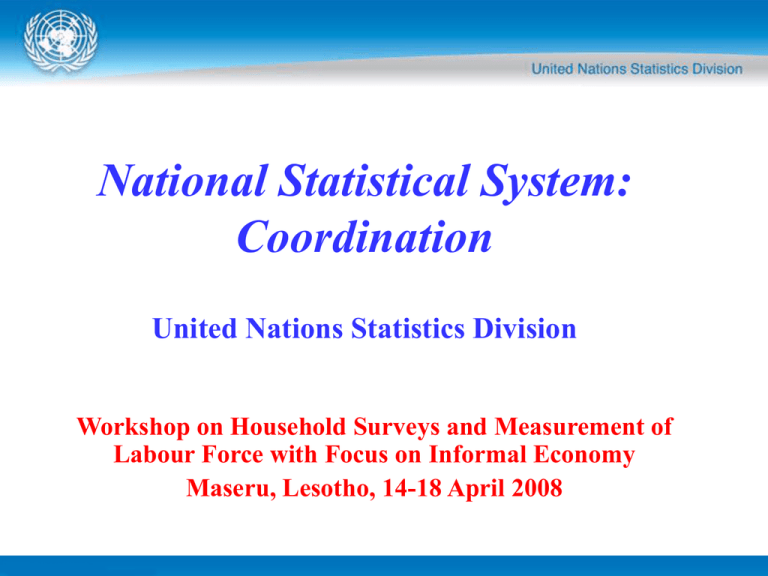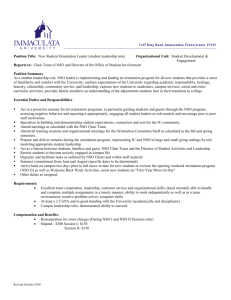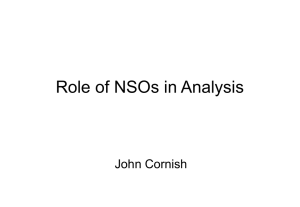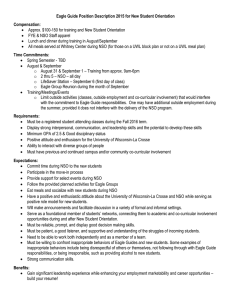National Statistical System: Coordination United Nations Statistics Division
advertisement

National Statistical System: Coordination United Nations Statistics Division Workshop on Household Surveys and Measurement of Labour Force with Focus on Informal Economy Maseru, Lesotho, 14-18 April 2008 •Official statistics are broad in scope and are produced by many different government agencies •In many countries there is a central or national statistical office that produces the greater share of official statistics, • whereas in others countries there is more than one statistical agency handling different areas of statistics. 2 The National Statistical System (NSS) … • National Statistical Office (NSO) •Central Bank • line ministries (education, health, labour, agric, etc.) and •other agencies 3 Fundamental Principles of Official Statistics - Principle 8 “Coordination among statistical agencies within countries is essential to achieve consistency and efficiency in the statistical system.” 4 Coordination is essential to … • promote consistent standards and methods • promote comparable data in different fields • avoid duplication of work • create a single image and trust in statistics • minimize respondents reporting burden 5 Coordination is essential to … (cont’d) • facilitate the integration of data from different sources • represent country in international initiatives. • improve the design of data collection instruments and introduce new analytical products 6 Coordination is difficult, because … • in general: No-one likes to be coordinated • there are areas with a high degree of specialization • Statistics is compiled on admin. records • Sharing information is prevented by law 7 Coordination is difficult, because … cont’d • Nobody else than the NSO will feel responsible for the coherence of the statistical system as a whole • Ideally, official statistics should be perceived by users as a kind of brand that guarantees integrity and quality & NSO should set the example in this respect, but credibility is dependent on institutions and therefore difficult to spread to other agencies 8 Who should lead the NSS? • in a NSS, the NSO has important statistical leadership responsibilities. – the bulk of the statistical expertise exists in the NSOs, and – users seek cohesion across all statistics, irrespective of the source. • the NSO or some other coordinating agency will need to take the lead in raising awareness of the benefits of co-ordination of statistical activities. 9 Role of NSOs to facilitate a sound NSS • Preparation and monitoring of statistical programmes, in regular dialogue with other producers (and users) • Developing standard classifications and making them available to other providers of statistics together with appropriate support resources • Developing and promulgating statistical frameworks, standards and definitions for use by all providers of statistics30 10 Role of NSOs to facilitate a sound NSS (cont’d) •Disseminating manuals of good practice and providing training programs to support them •Developing agreed protocols for the National Statistical System • Developing meta data standards for describing collections, particularly the quality of statistics derived from these collections • Developing directories of statistical sources. 11 Coordination tools … • There should be some guidelines for coordination activities within NSS • Co-ordination requirements in some countries are specified in statistics act. • Active management of the NSS through development of all professional statistical staff and the sharing of software, data, registers etc. 12 Coordination tools … (cont’d) • Statistical registers and sampling frames for surveys centralized for the NSS: – Either the NSO draws the sample for other producers and advises them in design and methodology of sample surveys; or – All household and business samples surveys for official statistics are carried out by the NSO 13 Coordination tools …. (cont’d) • Governance arrangements: Inter-agency committee, National statistics council, etc. • Standards have to be discussed with other producers before they are made binding • Government-wide statistical budget • Placement and exchange of staff 14 Useful points for coordination •Other producers should perceive the coordination role of the NSO as providing value added for them, and not as intrusion •Clear assignments of responsibilities and division of work in the statistical programme(s) to avoid conflicts •Fundamental Principles apply to all producers, and it is the task of the NSO to advise and monitor other producers in this matter 15 Review of the implementation of the FPOS on coordination: Africa In a survey by UNSD in 2003, the coordination principle was reported to be the most difficult to implement (self-assessment by countries) 16 Are there any other producers of official statistics other than the NSO in your country? • ≥ 90 % said YES • However, the NSO is the dominant producers of official statistics in most countries • Examples for other users: – line ministries – Sub-national offices producing statistics for their regions 17 Forms of relationship between the NSO and the other producers of official statistics: - Other government entities produce statistics based on questionnaires and methodology supplied by the NSO; - Other entities can collect statistics only subject to permission from the NSO; - Ministries produce data within their field of work and submit it to the NSO 18 Are there organizational arrangements to coordinate data collection for statistics at the national level? • ≥ 85% said YES • Coordination is implemented through: - National statistical legislation; - annual or multi-annual plan for data collection 19 Are there organizational arrangements for setting statistical standards at the national level? • ≥ 80% said yes • Arrangements were specified by: - The statistical legislation which specifies common standards. - A central body, either the NSO or another body cooperating with the NSO, is assigned this responsibility by law. 20 Are there organizational arrangements for setting statistical standards at the national level? - National Statistical boards/councils/ committees carry out coordination role - Joint committees of the NSO and other agencies are established for surveys in specific subject matter fields - Standards are set through consultations with producers and users - There is no formal organizational arrangement 21 Profile of legislations on coordination in SADC Countries Angola • 1996 Basic Law on NSS; Coordinator of NSS – National Statistics Council Botswana • 1967 Statistical Act – focuses on NSO. No specific mention of NSS DR Congo • Multi-annual work programme of 2005-2009 mentions coordination of statistical activities 22 Profile of legislations on coordination in SADC Countries … cont’d Lesotho • Statistics Act of 2001 establishes Nat Stat Council, with one of its functions being ensuring coordination between producers and users • NBS promotes coordination • NSDS, which will ensure strong NSS, is being developed Madagascar • 1967 Statistical Act mentions development and coordination of official statistics • Decree of 1989 – created a Coordination Com. for stat activities Malawi • 1967 Statistical Act –NSO coordinating role in the NSS • NSS Development Plan underway 23 Profile of legislations on coordination in SADC Countries … cont’d Mauritius • created stat units in gov’t ministries • implementing NSDS to reform NSS • NSO coordinator of NSS Mozambique • Presidential decree of 1996: NSO (INE) is the central executive body of the NSS • INE responsible for official statistics 24 Profile of legislations on coordination in SADC Countries … cont’d Namibia • NSO responsible for official stat • NPC Stat advisory committee South Africa • - Statistics Act of 1999 specifies coordination between SSA and other organs of State that produce official or other statistics Tanzania • NBS only agency entrusted to provide official statistics to the Government • Statistics Ordinance of 1961 (Dec 2001) gives SSA coordinating statistical activities in the country. 25 SADC - Collaboration with other institutions Nat’l institutions Min of Labour Min of Planning Business chambers Nat’l women’s machinery Research institutions Academic institutions Regularly Occasionally No 8 6 1 2 5 4 1 4 3 11 6 2 3 7 6 4 4 26 International initiatives supporting NSS Global Statistical System • It is evolving • Many of the elements that are important to NSO are also important to int’l agencies Reference Regional Strategic Framework - Overall objective is to strengthen NSSs National Strategy for Development of Statistics - key contribution in the transition to evidencebased policy making by improving NSSs 27 For discussion: • How does your office coordinate? • What works? Why? • What does not work? Why? 28 Sources: UNSD: Fundamental Principles of Official Statistics, http://unstats.un.org/unsd/methods/statorg/FP-English.htm Heinrich Brüngger, United Nations Economic Commission for Europe Statistical Division, “The National Statistical System: What does it mean in practice?” Contribution to the Statistical Seminar in Skopje, 4 October 2006, http://www.stat.gov.mk/seminar_CD/simpozium/Skopje_Simpozium_en.2006.ppt Third meeting of the Statistical Conference of the Americas of the ECLAC, Santiago, Chile, 1-3 June 2005, LC/L.2318 (CEA 2005/8) 26 Apr 2005 Paris21 web page: http://www.paris21.org/pages/designing-nsds/presentation-events/ 29




